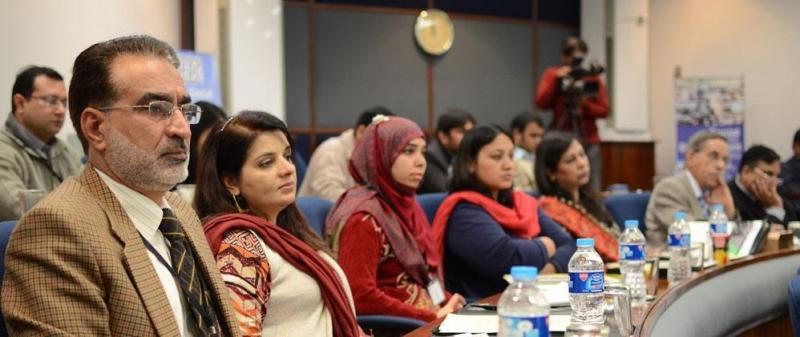
A conference titled, Leading a Reform Agenda in the Social Sector: Capacity Development of Women of Today was organised at the Lahore University of Management Sciences (LUMS), by the Social Enterprise Development Centre (SEDC)-LUMS on December 14, 2013.
The conference was lined up to showcase research findings of the strategy papers, sharing the work of the Women Leader’s Network (WLN), and to discuss the outcomes of capacity development trainings conducted under the project National Leadership for Reproductive Health & Development (NLRHD). The project was funded by the David & Lucile Packard Foundation and was completed over a period of 3 years (2011-2013). Phase 1 of the project began in 2008 and ended in 2010. With the support of the Packard Foundation, SEDC has successfully completed six years in the dissemination of specialised trainings in the health sector. Under the NLRHD Project, SEDC has established cross-sectoral linkages among women leaders across Pakistan to advocate policy changes for Family Planning and Reproductive Health (FPRH) issues, which led to the creation of a Women Leaders Network. In addition to 13 case studies and 6 strategy papers being formulated, 617 individuals have also been trained by LUMS faculty via this partnership.
The event kicked off with a welcome address by the Vice Chancellor of the Lahore University of Management Sciences (LUMS), Dr. Sohail Naqvi. He emphasised the importance of health and education for the growth of any nation and specifically highlighted the need to focus on reproductive health issues for societal betterment. Dr. Yasmeen Qazi, Senior Country Advisor, Population Program for the David and Lucile Packard Foundation, also addressed the gathering and brought attention to the need for Pakistani corporations and donors to invest in the development of the nation as the country was already far too heavily reliant on international aid. She rejected the trend stating that, in the long run, it would be unsustainable. She congratulated the SEDC team for doing such a thorough study of the health sectors under the project. She remarked, “We started our project with SEDC-LUMS because we knew that LUMS graduates would eventually end up high in the corporate world and we wanted to invest in future linkages, today. LUMS has a lot to offer in terms of bolstering the development sector of Pakistan.”
Khawar Mumtaz, Dr. Misbah Tanveer and Sarah Hussain showcased their findings from research in the Livestock, Textile and Football manufacture sector, respectively. The research highlighted the need for greater civic responsibility, sensitisation to reproductive issues and government interventions in order to improve reproductive health for marginalised and working class sections of society.
Panel discussions were held regarding the power of Women Leaders Network (WLN) and the Impact of Trainings lead by Dr. Misbah Tanveer and Dr. Anwar Khurshid respectively. The enthusiasm of the panellists revealed the success of both the WLN and HELP Training Sessions both in terms of leadership and FPRH awareness.
Around 60 participants, including LUMS faculty members, senior management of various national and international NGOs, members of women leader network, civil society and project-training participants, attended the conference.




